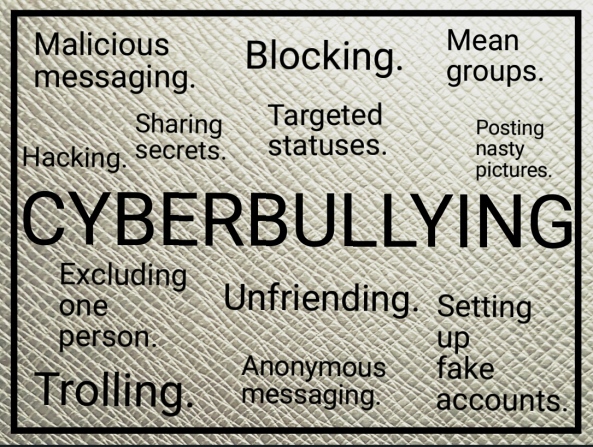Recently, I have noticed that cases of cyber-bullying are being reported more and more often in the news. As social media and technology is already a central part of children’s lives, online safety is an incredibly important issue to tackle.

What is cyberbullying?
Cyberbullying is defined as,
“the act of harassing someone online by sending or posting mean messages, usually anonymously.” Dictionary.com
How does it affect schools?
Studies have found that the problem of cyberbullying in schools is on the increase (DFE, 2015). In addition, it is not only students who bully students but in fact students have been found to bully teachers online and unbelievably even teachers have reportedly bullied fellow colleagues.
I have made a graphic to help you spot the main forms of online bullying in schools:
How can schools tackle the problem?
Watch my video for 10 tips to prevent or deal with cyber-bullying:
- Educate pupils: ensure e-safety and cyber-bullying is part of the school curriculum in every age group.
- Introduce an e-safety and cyber-bullying policy. Here is a good example which you can amend to suit your school.
- Have a good reporting system: class worry boxes, posters of help-groups and support websites.
- Encourage communication. Make sure pupils, parents and family members feel comfortable to share concerns and information.
- Show teachers how to spot signs of cyber-bullying i.e.reluctance to use a computer/mobile device, not wanting to come to school, anxiety, mood swings.
- Include cyber-bullying in your school’s behaviour management policy with clear, serious sanctions.
- Find out why a child has become a cyber-bully. Support them too as there is probably a reason behind their behaviour.
- Talk to parents about ways they can monitor their child’s online activity (only using a computer in a communal area, use of a net nanny service, filters, asking for their passwords).
- If very serious i.e. hacking, stalking or identity theft, get the police involved.
- Once resolved, keep monitoring the situation in case it reoccurs.
Have you had incidences of cyber-bullying in your school? How did you deal with it? Let me know by commenting below.




Great post, thanks
LikeLiked by 1 person
I ran a short course at our school for bullies. There was a lot of support for the bullied, but there does not seem to be any programmes for bullies. I felt that telling them not to do it was not going to change their behaviour, so I wrote a short course. In talking to the students most of them were bullied and felt that if they didn’t bully they would be seen as weak.
LikeLiked by 1 person
Will you share the course?
LikeLike
Sounds like a great idea 👍
LikeLike
In the past as an educator, I haven’t experienced this just yet!!!!
LikeLike
Interesting and timely post. I am going back into substitute teaching. I’m concerned about bullying, real and imagined. Example: I have a student who tells me her neighbor is bullying her. I haven’t seen it but she keeps complaining. My reaction is to move her which doesn’t really seem to be a great solution to me and report it to the teacher Or should I take the time and take both kids out to the hallway to visit about the problem. Or should I wait until a natural break and then approach it with both kids? Some advice would be extremely helpful!
LikeLike